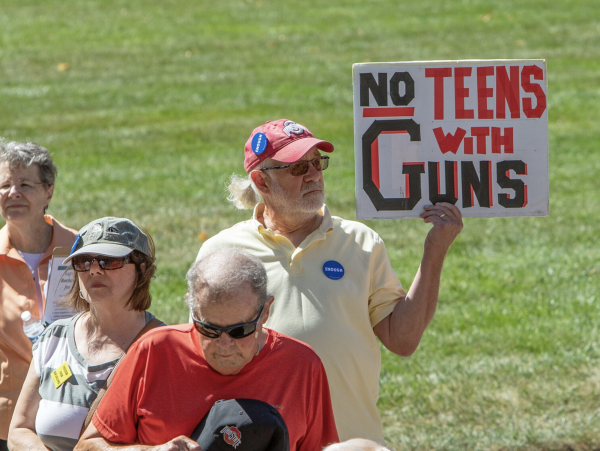On Sept. 10, Charlie Kirk was fatally shot on the campus of Utah Valley University. The American conservative political activist advocated for gun rights. He argued for greater protection of the Second Amendment right to bear arms and slashing states’ regulation of gun control. However, in the wake of Kirk’s shooting, increasing gun regulations is more essential than ever.
Guns are the leading cause of death for people aged one to 19 in the United States. The history and continued prevalence of school shootings and their impact on our generation’s experience are deep and complicated.
From the 2000 to 2022 school year, there were 1,375 school shootings, causing 515 deaths, according to federal data. During this time, some school shootings that gained national attention include Columbine High School (1999), Virginia Tech (2007), Sandy Hook Elementary School (2012), Marjory Stoneman Douglas High School (2018) and Robb Elementary School of Uvalde, Texas (2022). Unfortunately, this list is wildly incomplete and only encapsulates a fraction of school shootings’ devastation.
Despite widespread anger, lawmakers passed no legislation after Columbine. Sandy Hook Elementary School became one of the first shootings where state governments took action. Connecticut and some other states placed restrictions on buying firearms, including background checks and bans on certain firearms. A staunchly pro-Second Amendment state, Florida, passed the Marjory Stoneman Douglas High School Public Safety Act in 2018. This state law raised the minimum age to buy a rifle to 21, a three-day waiting period occurs after every gun purchase and a “red flag” law can allow the temporary removal of firearms from people. Following the Robb Elementary School shooting, President Joe Biden signed the bipartisan Safer Communities Act, which is considered the most significant gun legislation in decades. This act incentivized all states to pass the “red flag” law, increased background checks for buyers under 21, disarmed domestic abusers and focused federal support to mental health and school safety programs.

The long history of gun violence in schools demonstrates why gun regulations are necessary to protect lives, especially students. Moments after Kirk’s death, a school shooting occurred at Evergreen High School in Evergreen, Colorado. The shooter critically wounded two students and took his own life. Despite the violence inflicted on the students, most news sources were delayed in their reaction to the event because the shooting of Kirk dominated headlines. When shootings must compete for media coverage, gun violence goes beyond isolated events. It becomes an epidemic—one that is necessary to address for the safety of our future generations.
House Speaker Mike Johnson led a prayer vigil for Kirk on Capitol Hill the evening following his death, but the moment of silence slowly turned into a point of political conflict. When Republican South Carolina Representative Lauren Boebert called for a spoken prayer, Democratic representatives protested. But, regardless of ideological stance, they brought up a crucial argument.
Why was the death of one political activist deemed more relevant and impactful than an average of 125 Americans killed with guns every day, according to Everytown for Gun Safety, a nonprofit for gun control? The murder of a prominent political activist should not be necessary to prove the dangers of unregulated firearm usage. A seemingly never-ending list of students lost to gun violence is evidence enough of the need for greater gun regulations.
It has never been more urgent or timely for students to advocate for gun regulations. Ultimately, we are the ones in the classrooms when a gunshot goes off, not the policymakers or politicians. We live the reality that politicians debate abstractly.
Every life is important. And therefore, every death is, unequivocally, a tragedy. But, Kirk’s death is also an opportunity for us to learn. Gun violence does not care about ideology. It is the leading cause of death for children in America, and it will continue to be unless we take action to regulate firearms now.




